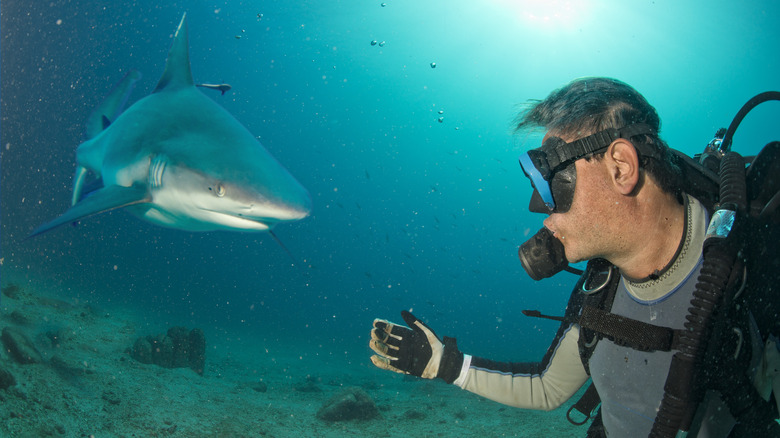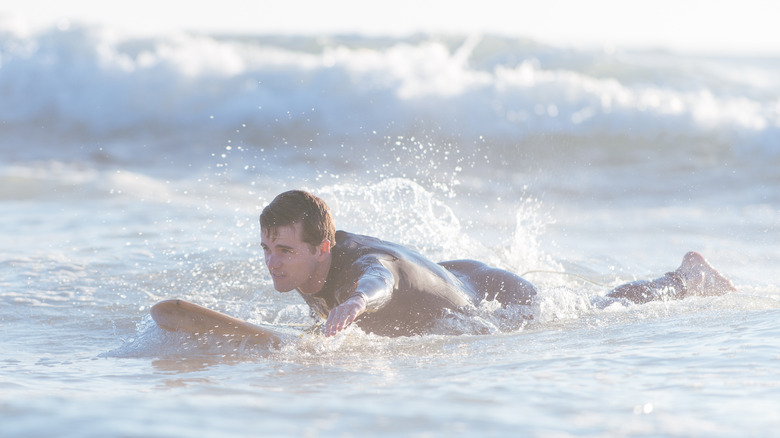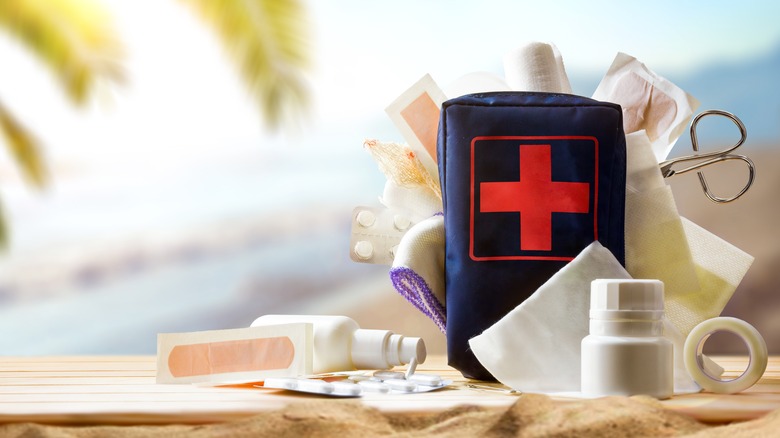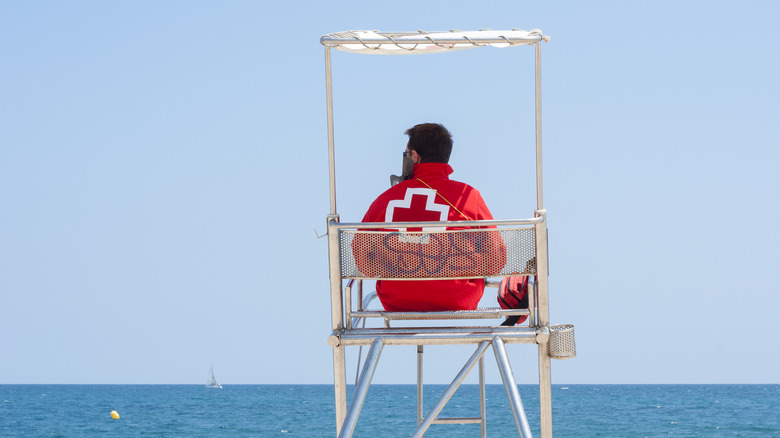How To Survive If You're Attacked By A Shark
Perhaps no creature swimming in coastal waters is viewed with such a mixture of fear and fascination as sharks. It is a safe assumption that most, if not all, of the millions of people who spend time in the water have had thoughts of a shark attack creep into their minds at some point. Just as likely, the majority of those daydreams (or nightmares) end with the shark inflicting a fatal wound.
The reality is that the chances of an attack are remote — minuscule, actually, as fewer than 100 attacks occur worldwide, according to the Florida Museum of Natural Science, the entity that maintains the International Shark Attack File. However, they are never zero, so those enjoying time in the water should always be aware of the danger that does exist, especially considering some of the world's most dangerous sharks swim within sight of the beachfront.
If an attack does occur, it is not necessarily the death sentence it is often imagined to be, as, on average, only half a dozen people die by shark attack each year, according to International Shark Attack File statistics. Knowing what to do if you are attacked by a shark can greatly enhance the odds of your survival.
Avoid being attacked
Though it may sound cliché, the best thing to do for a shark attack is to avoid being attacked in the first place. The Florida Museum, not only keeps track of attacks as they occur, they issue a list of "don'ts" in order to prevent an attack from happening.
Among the things to avoid in order to reduce your chances of being attacked:
- Stick swimming in shallow, clear water.
- Don't swim alone.
- Avoid excessive splashing, which can be mistaken for struggling fish.
- Don't swim around schools of fish, as they may be prey for sharks.
- Avoid swimming at low-light periods such as dawn, dusk, and night.
- Don't swim far from shore.
- Avoid wearing shiny jewelry or bright clothing.
- Don't enter the water if sharks are known to be present.
While these guidelines are not foolproof, they have been proven to reduce the chance of a shark attack greatly. However, again, the chances are never zero, so it is important to know what to do if you are approached or attacked by a shark.
Stay calm and stand your ground
Bathers frantically fleeing after hearing screams of "Shark!" are common scenes in movies and television shows. However, in reality, once a shark has singled you out, one of the worst things you can do is panic. It is important to keep calm so that you can both keep your thoughts clear and not draw even more attention to yourself. Try to maintain visual contact with the shark and calmly but quickly attempt to exit the water — either to a waiting boat or the beachfront. Try to avoid excessive splashing as you retreat, as that commotion may attract a shark which mistakes it as a fish splashing on the surface.
If you are unable to get out of the water, be sure to stand your ground. You should continue to face the shark and make yourself appear as big as possible, which may deter the shark from attacking (or continuing to attack). Making sudden, aggressive movements is one last-ditch way to attempt to discourage a shark from continuing with its aggression.
Defend yourself
This may not sound logical when considering the strength and ferocity of a shark, but fighting back is often the best way to survive an attack. The Victoria Fisheries Authority, which is responsible for managing some of the world's sharkiest waters, strongly states that passive behavior such as playing dead simply doesn't work to ward off an attack. Instead, their advice is to fight back once an attack is initiated.
Hitting the shark on the snout or attacking their eyes and/or gills gives swimmers the best chances to convince the shark to cease and desist. There is no such thing as a fair fight when tangling with a shark, so use whatever is within reach to fight off the attack — surfboard, bodyboard, fishing rod, boat paddle, etc. Sharks' jaws are extremely strong. Any hard object that can be used to assist in fighting off an attack can provide some separation between the shark's sharp teeth and human flesh.
Get out of the water as quickly as possible
As soon as the opportunity presents itself, get out of the water. Whether this means getting back on a boat or returning to the beach, as soon as the shark turns its attention away, a hasty exit is in order. Remain calm, but retreat with a purpose. While making your way back to the boat or beach, try and keep track of the shark's whereabouts so as not to be taken by surprise if it returns to continue the attack.
If possible, once you make it back to shore, warn others who may not be aware a shark is in the area. With the chaos that often accompanies crowded beaches, even something as traumatic as a shark attack may go unnoticed by many. So, any warning that can be issued may prevent another attack as well as help draw attention to any assistance you may require after surviving an attack.
Keep pressure on the wound
Sharks are notorious for their rows of razor-sharp teeth. Even the mildest of attacks is likely to result in some sort of open wound. This is where first-aid and emergency supplies come in clutch for providing the best chance for survival and full recovery. Ideally, first-aid duties will be handled by someone else once you are out of the water. However, if attacked at a time when no others are around, you need to know what steps to take in order to save yourself.
Even before getting out of the water, attempt to put pressure on the wound to slow the bleeding. Once out of the water, continue with first aid. This includes, first and foremost, keeping pressure on the wound to stop or slow the bleeding. If the wound is severe enough, a tourniquet may be necessary to stem the bleeding to an extremity. Once the bleeding is controlled, cleaning and dressing the wound can help prevent infection.
According to a study published in the Journal of Clinical Microbiology, shock and even cardiac arrest can also occur following a shark attack. So, it is important to be aware and be monitored for any delayed responses and medical conditions even after the attack has ended and you are back on dry land.
Call for help and get medical attention
Getting help is often critical in surviving an attack or mitigating the severity of injuries inflicted by a shark. It is never too soon to call for help. Call for help early and often — before, during, and after an attack. Other beachgoers, boaters, or lifeguards in the area can possibly help ward off an attack, cause a shark to abandon its attack, and/or render first aid following an attack.
Following an attack, it is imperative to get medical attention. This is a no-brainer when it comes to severe injuries. However, even a small bite that may not seem too serious needs to be seen by a doctor. The study published in the Journal of Clinical Microbiology warns there are a variety of infections that can occur as a result of a shark bite, including several strains of vibrio. Additionally, unseen internal injuries may also be present. So, prompt medical attention is essential even if the wound is not immediately life-threatening.






